GENERAL
The educational policy of Doping Authority Netherlands makes a clear distinction between elite sports (organised sports) and fitness (sports organised on other lines). Elite sports are subject to doping regulations. Doping Authority Netherlands has the authority to conduct doping controls on the basis of these regulations. That is not the case in the fitness sector and so a different approach is required there. Furthermore, Doping Authority Netherlands is responsible for providing the general public with information.
IMPACT OF THE CORONA PANDEMIC
The corona pandemic has had a major impact on the implementation of the education policy. The number of educational sessions and outreach events (stands at events) involving a physical presence was drastically reduced. A number of other activities were organised differently than usual (such as the Support Clean Sport Day) or they did not take place at all (True Strength Day, Symposium commemorating 10 years of the Steroids Clinic) in 2020. Far fewer questions were asked via the Doping Information Line and the Doping Information App was downloaded less often. It also proved much harder to generate attention for the Be PROUD programme. The initiative was snowed under by the challenges in sport posed by the corona pandemic. An 'incentive budget' for sports federations was actually not used. On the other hand, the number of completed e-learning modules rose sharply. In addition, more web messages have been written for True Strength.
ELITE SPORTS
The objective for elite sports is: the prevention of inadvertent and deliberate doping infringements in Dutch sport.
The three main target groups in elite sports are:
- Elite athletes
- Support staff
- Sports associations
Implementation of the 2021 Code and International Standard for Education
The World Anti-Doping Code 2021 and the associated eight international standards were approved in late 2019. Two standards were entirely new. One of those is the International Standard for Education. This standard requires all signatories to the Code to have an education plan in place by 1 January 2021. Signatories are required to develop, implement, monitor and evaluate education programmes on the basis of that plan. In preparation, Doping Authority Netherlands had already drawn up a new education plan. The development of the associated education programme – the National Education Programme – was largely completed in 2020. In cooperation with sports associations, the first steps were taken to implement the programme. It should be pointed out that the National Education Programme also builds on the Ongoing Education Modules for Clean Sport that Doping Authority Netherlands developed previously in collaboration with NOC*NSF.
Elite athletes
To prepare promising athletes over a period of eight years for competition at the global level, the Doping Authority developed the 'Doorlopende Leerlijn Dopingvrije Sport' (ongoing education for doping-free sports) in collaboration with the NOC*NSF in 2015. This programme describes the knowledge, skills and attitude needed for doping-free sport for all ages and development phases.
Education sessions in person
In line with these phases, Doping Authority Netherlands has developed three different education modules: Bronze, Silver and Gold. Bronze was designed as the first module and it serves as an introduction to the topic of doping. Silver focuses more on practising skills such as checking medicines and dietary supplements. During the Gold programme, the athletes are trained to work with difficult doping dilemmas that they may encounter during their careers such as suspicions that a teammate may be involved with doping or using approved medication purely and simply to perform better.
In 2020, Doping Authority Netherlands provided a total of 31 education sessions for a total of approximately 550 elite athletes (an average of 18 elite athletes per session). Seven sessions were organised online with Microsoft Teams or a similar program. The rest took place in person. This is a much smaller number than in previous years.
| Education module | 2017 | 2018 | 2019 | 2020 |
|---|---|---|---|---|
| Bronze | 53 | 33 | 43 | 9 |
| Silver | 18 | 17 | 16 | 8 |
| Gold | 2 | 2 | 2 | 2 |
| Combination | 18 | 32 | 22 | 12 |
| Total | 91 | 84 | 83 | 31 |
E-learning platform
It was difficult to schedule education sessions in person in 2020. Fortunately, the Doping Authority had already launched an e-learning platform in March 2017. The Bronze, Silver, Gold and National Testing Pool modules were available for elite athletes on this platform. The Bronze, Silver and Gold modules match the Bronze, Silver and Gold education sessions conducted in person. The National Testing Pool module is intended for elite athletes who have been included in the National Testing Pool by Doping Authority Netherlands. They must provide supply whereabouts information (accommodation and location data).
| Education module | 2017 | 2018 | 2019 | 2020 |
|---|---|---|---|---|
| Bronze | 494 | 1.368 | 1.848 | 2.409 |
| Silver | 114 | 330 | 675 | 532 |
| Gold | - | 129 | 230 | 271 |
| National Testing Pool | - | 65 | 46 | 92 |
| Total | 608 | 1.892 | 2.799 | 3.304 |
The back end of the e-learning platform underwent an overhaul in 2020. In addition, an option has been added that allows e-learning users to rate a completed e-learning module on a scale from 1 to 10. The ratings for the e-learning modules were as follows: Bronze 8.1, Silver 7.9, Gold 8.0 and National Testing Pool 7.8.
Videos
Doping Authority Netherlands produced a video in 2020 about remote urine controls during the corona pandemic.
Doping Information App
The Doping Information App has been with us since late 2013. The app works on iOS and Android. There is also a responsive website. The Doping Information App allows athletes and support staff, among others, to check their medication and dietary supplements, check the most important doping regulations and look at the doping control procedure. The app was downloaded approximately 3,200 times in 2020 (2019: approximately 5000 downloads). The total number of downloads was in the region of 37,200 at year-end 2020. The Doping Information App is updated continuously. The app is also constantly promoted, for example at education sessions, on a range of websites, in various articles, and on Z cards and posters.
Be PROUD
Be PROUD is an initiative of Doping Authority Netherlands and it focuses on affirming the right sporting values. The programme was established in collaboration with NOC*NSF, elite athletes of the present and past, and trainers/coaches. It was launched in the summer of 2018. Athletes, family, coaches, medical staff, sports association staff and other sports enthusiasts are being invited to support Be PROUD, either as supporters or ambassadors. Sports organisations also have the option of being partners. In this way, a large and powerful team will be established that is proud of clean sports. The Be PROUD programme has its own website and social media accounts on Instagram, Facebook, Twitter and YouTube.
At year-end 2020, Be PROUD had twelve ambassadors. The ambassador who joined in 2020 was Ran Faber (korfball). The eleven other ambassadors are Eva Voortman (softball), Margriet Bergstra (judo), Rogier Hofman (hockey), Sophie Souwer (rowing), Steve Wijler (archery), Epke Zonderland (gymnastics), Jessica Schilder (athletics), Jetze Plat (handbiking/paratriathlon), Kai Verbij (speed skating), Madelein Meppelink (beach volleyball) and Vince Rooi (baseball).
Be PROUD partners qualified for an incentive budget of € 1,000 maximum as support for their partnership activities. To obtain the budget, they were required to submit a project plan with a concrete description of the activities. The budget was allocated to two partners but the plans have not yet been put into practice. This means that no money has been paid out in 2020 either.
The number of member organisations (Be PROUD partners) remained at 36 in 2020. The number of supporters rose from 1,182 to 1,376. To promote Be PROUD, bottles and vials of hand gel were developed in 2020. Wall signs were also made for Be PROUD partners that they can display inside and outside to announce their partnership. In late 2020, Doping Authority Netherlands called in BOOM Communicatie to provide strategic advice about the further development of the programme. This firm was also involved in the launch of Be PROUD.
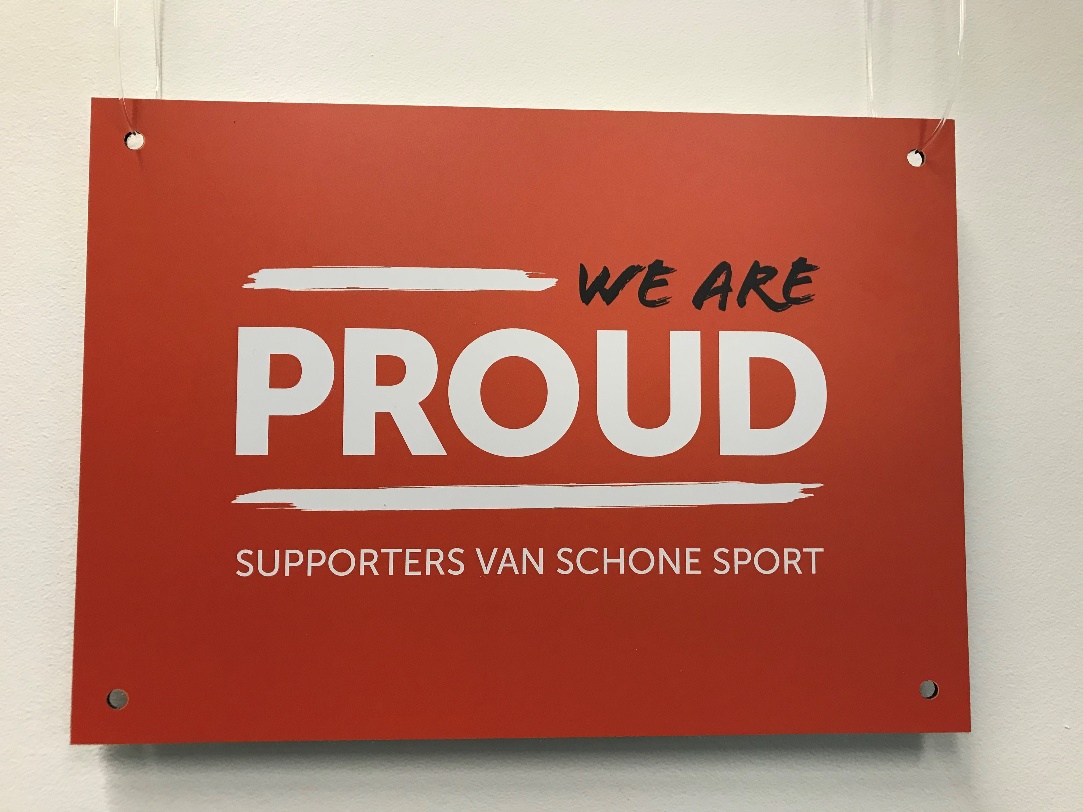
Outreach Events
At outreach events, Doping Authority Netherlands is present with a stand at a sporting event in order to promote Be PROUD and to provide general information for large groups of elite athletes and support staff. There were two outreach events in 2020: the KNAF licence day in Eindhoven (22 January) and the Dutch national boxing championships (1 and 2 February). There was also an outreach event during the international doping conference ICIC2020 (15-17 January) but it was of a different nature because the people present were from the anti-doping world.
Dutch Safeguards System for Dietary Supplements in Elite Sport (NZVT)
Dietary supplements can contain prohibited substances. That is often not stated on the label. The use of dietary supplements therefore constitutes a risk for elite athletes because it can lead to a positive result from a doping control. In response to this risk, the Doping Authority established the Dutch Safeguards System for Dietary Supplements in Elite Sport (NZVT) in 2003. The system allows manufacturers of dietary supplements to have batches of their supplements checked in exchange for payment. The 'clean' product-batch combinations are added to the NVZT database.
A total of 351 NZVT certificates were issued in 2020 (for 588 product-batch combinations). This is the highest number ever, a sign that the system is still catering to a significant need for athletes and their support staff. In total, on 31 December 2020, there were 1,331 product-batch combinations on the NZVT website representing 291 products, 56 brands and 16 substantive categories. Four batches were rejected because prohibited substances were found in them and one batch was rejected because it was found to contain a pharmacological substance.
| Year | number |
|---|---|
| 2003 | 99 |
| 2004 | 72 |
| 2005 | 53 |
| 2006 | 72 |
| 2007 | 52 |
| 2008 | 51 |
| 2009 | 72 |
| 2010 | 108 |
| 2011 | 140 |
| 2012 | 160 |
| 2013 | 182 |
| 2014 | 183 |
| 2015 | 198 |
| 2016 | 281 |
| 2017 | 288 |
| 2018 | 260 |
| 2019 | 266 |
| 2020 | 351 |
| Year | rejected because prohibited substance(s) were found | rejected because it was found to contain a pharmacological substance |
|---|---|---|
| 2003 | 1 | |
| 2004 | 3 | |
| 2005 | 0 | |
| 2006 | 2 | |
| 2007 | 2 | |
| 2008 | 0 | |
| 2009 | 2 | |
| 2010 | 1 | |
| 2011 | 1 | |
| 2012 | 1 | |
| 2013 | 0 | |
| 2014 | 5 | |
| 2015 | 2 | |
| 2016 | 7 | |
| 2017 | 4 | |
| 2018 | 7 | |
| 2019 | 2 | |
| 2020 | 4 | 1 |
Support staff
Alongside the focus on athletes, there has been rising interest in support staff in recent years. This group mainly includes the trainer-coaches, but also doctors, physiotherapists, dieticians, masseurs, soigneurs, psychologists and parents.
Education sessions in person
A total of 11 education sessions were organised for approximately 250 support staff in 2020: 60 trainer-coaches, 110 parents and 80 medical/paramedical support staff (including doctors, physiotherapists and dieticians). Four education sessions were organised online with Microsoft Teams or a similar program. Four of the ten sessions were for trainer-coaches and seven for other categories. The trainer-coach education sessions are based on the Ongoing Educational Module for Doping-Free Sport for trainers and coaches. Doping Authority Netherlands has developed three different basic education modules for this purpose: Trainer-Coach 3, Trainer-Coach 4 and Trainer-Coach 5 (also known as Master Coach). The modules correspond to the training structure of the Sport Qualification Structure. In 2020, all four of the education sessions for trainer-coaches were provided in this way. The seven education sessions for other groups of support staff were for specific groups.
| Education module | 2017 | 2018 | 2019 | 2020 |
|---|---|---|---|---|
| Trainer-Coach 3 | 3 | 6 | 3 | 1 |
| Trainer-Coach 4 | 3 | 3 | 3 | 2 |
| Trainer-Coach 5 / Mastercoach | 2 | 5 | 4 | - |
| Combination | - | 1 | 1 | 1 |
| Specific sessions | 16 | 5 | 10 | 7 |
| Total | 24 | 20 | 21 | 11 |
E-learning platform
Doping Authority Netherlands has also developed e-learning modules for support staff. Support staff completed 275 more modules in 2020 than in 2019.
| Education module | 2018 | 2019 | 2020 |
|---|---|---|---|
| Trainer-Coach 3 | 145 | 108 | 294 |
| Trainer-Coach 4 | 102 | 60 | 98 |
| Parents | 32 | 24 | 52 |
| Medical and paramedical support staff | 8 | 14 | 37 |
| Total | 287 | 206 | 481 |
The e-learning modules have been rated by users with an average mark of: Trainer-Coach 3 7.8, Trainer-Coach 4 7.8, Parents 8.1 and Medical/paramedical support staff 7.9.
Print media
To reach the parents of talented and elite athletes better, Doping Authority Netherlands developed a postcard for parents in 2020. It provides a brief explanation of the role of parents in clean sport and a reference to the e-learning module for parents. Talented and elite athletes are asked to enter their home address on the map at the end of the Bronze and Silver education sessions conducted in person. Doping Authority Netherlands then sends the cards by post.
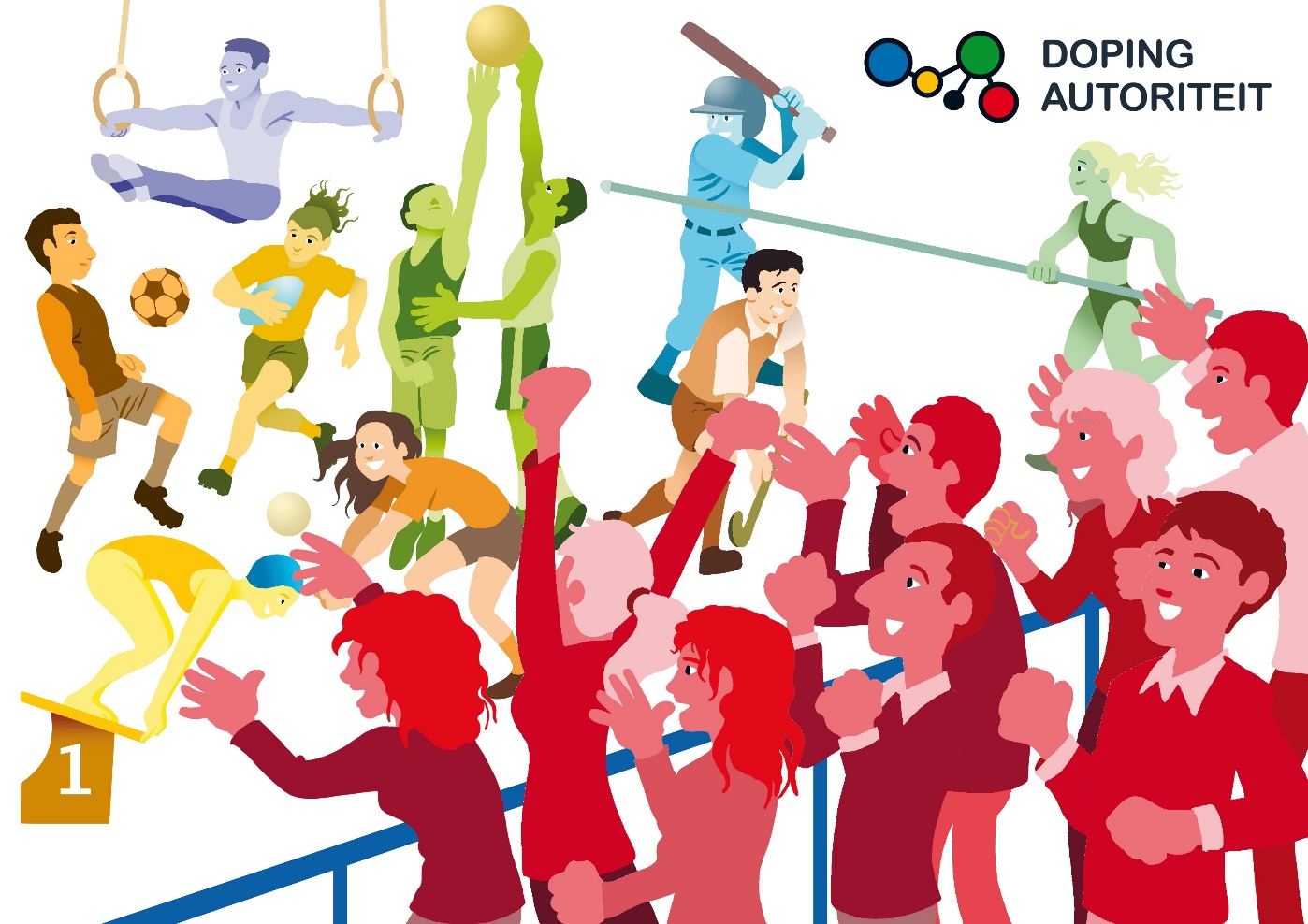
Sports associations
The sports associations are also an important target group for Doping Authority Netherlands. They are closest to the elite athletes and the support staff. Doping Authority Netherlands is in contact with the sports associations at all times.
Meeting of sports associations
The Support Clean Sport meeting (formerly known as the Association meet/Together against Doping meet) was organised for the eleventh time on 10 October. There were only a few participants present in person. Forty people attended the meeting online. The participants represented sports associations, RTOs (Regional Elite Sports Organisations) and CTOs (Centres for Elite Sports and Education). The aim of the annual meeting is to catch up on developments in the field of anti-doping. The average rating for the event from the participants was 7.8.
Implementation discussions for the National Education Programme
There were discussions with twelve sports federations in 2020 about the implementation of the National Education Programme, which was due to start at the same time as the introduction of the new Code and International Standard for Education (1 January 2021).
E-learning platform
Doping Authority Netherlands has the Sports Associations e-learning module for the sports associations. The module was completed 30 times in 2020 (2019??: 16 times). The average rating from e-learning users for the module was 7.1.
FITNESS
The objective for fitness (sports organised on other lines) is: preventing or discouraging deliberate and inadvertent doping use by athletes in Dutch fitness centres. There is also a focus on harm reduction, reducing the health risks associated with doping.
In the fitness world, Doping Authority Netherlands concentrates in particular on the people in the fitness centres: the athletes themselves but also the instructors (with whom we establish contact primarily through the various fitness courses) and the owners. Doping Authority Netherlands organised communications for this target group on the basis of the True Strength programme. The book Doping, the sober facts is published directly under the auspices of Doping Authority Netherlands rather than under the True Strength banner.
True Strength programme
There are 3 million fitness adherents in the Netherlands. This makes fitness the most popular sporting activity in the Netherlands. However, a survey in 2009 showed that 8.2% of fitness athletes use prohibited substances. This is, in principle, permitted because these people are not subject to doping regulations. However, the use of prohibited substances still harms health and it also has a negative effect on the image of the fitness branch itself. It is therefore desirable to reduce levels of doping in fitness centres. As a result, Doping Authority Netherlands decided to develop the education programme True Strength specifically for this group. Doping Authority Netherlands uses True Strength to inform people about the risks of using anabolic steroids and other prohibited substances, and to provide detailed information about healthy alternatives for becoming more muscular or slimmer using True Strength. That generates more knowledge and awareness. This process also affirms the values and norms associated with sports in line with True Strength.
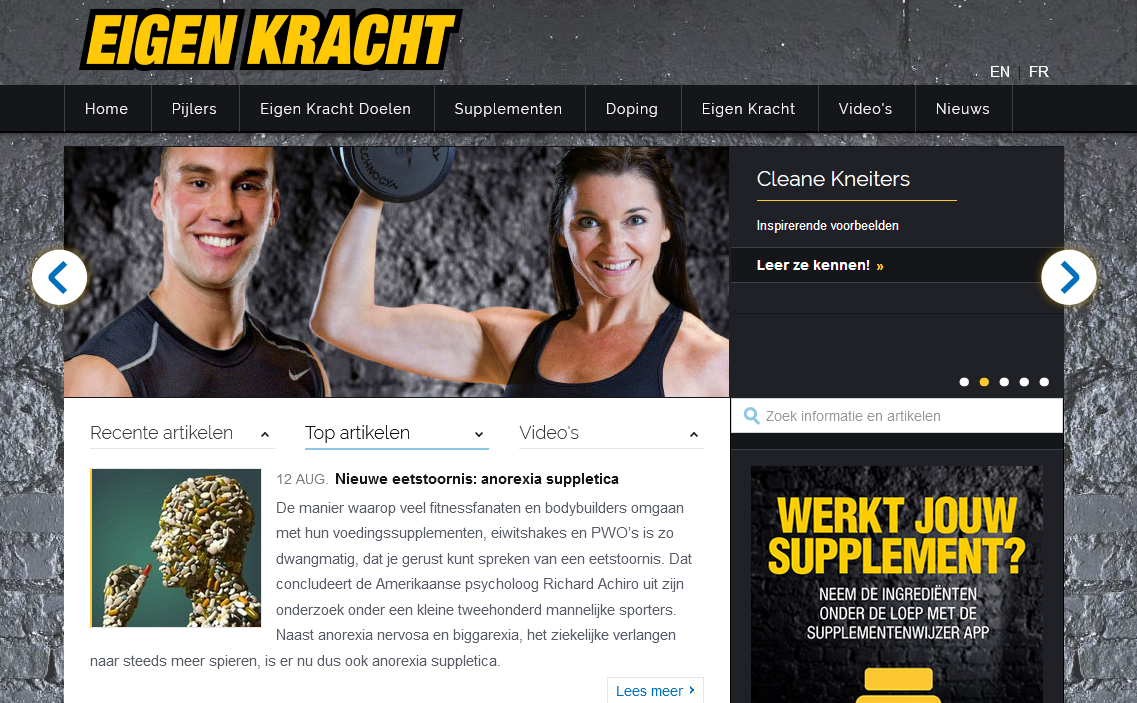
True Strength website
The True Strength website plays a central role in the programme. It provides objective, clear and practical information about how to build up muscle mass cleanly and effectively, and about sound ways of losing weight. There is also objective information about various types of prohibited substances and the side-effects, and the doping risks of dietary supplements are discussed. The True Strength website has existed for over twenty years and it contains over 1000 web messages and articles.
In 2020, a total of 91 factual news reports were posted on the site. They were written by three external experts (journalists or specific experts) from the fitness/bodybuilding branch and by our own education officers. This is more than in previous years, when an average of one news item a week was published on the website.
As of August 2020, True Strength used its own social media channels on Facebook and Instagram with multiple posts each week. The posts cover multiple themes that are identified with different icons (including training, nutrition, recovery, supplements). True Strength's web messages used to appear on the social media channels of Doping Authority Netherlands.
True Strength book
The Doping Authority completely rewrote the True Strength book in late 2018. The book complements the True Strength website and the Supplement Checker App. It was promoted persistently in 2020 on the website and at meetings. 1,500 copies have now been sold of this fourth, completely revised edition of the book. The fifth edition (with minimal revisions) was published in December 2020.
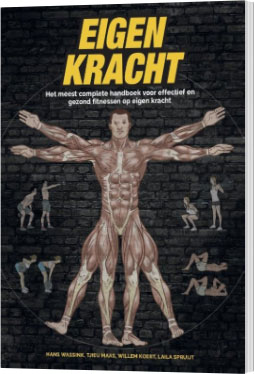
Supplement Checker App
The Doping Authority launched the Supplement Checker App in August 2017 under the True Strength banner. Over the past decade, the market for sport dietary supplements has grown explosively. Nearly 60% of fitness athletes in the Netherlands use supplements. Top athletes also use many supplements. The free Supplement Checker App helps athletes to work with supplements in a conscious and critical way. The heart of the app is a discussion and assessment of more than 3,000 ingredients.
The app was downloaded 3,250 times in one year (2019: 3,841). The Supplement Checker App was maintained continuously and expanded in 2020. In 2020, Doping Authority Netherlands wrote 85 new profiles for the Supplement Checker App (2019: 116). Thirty profiles were also amended on the basis of new insights.
Guest lectures and meetings
Doping Authority Netherlands gave two guest readings at fitness institutions in 2020 (2019: eight).
E-learning
The e-learning module Fitness Trainer A was completed by 46 people in 2020 (2019: nine).
Outreach Events
During outreach events, True Strength is present with a stand at fitness events in order to provide general information for large groups of elite athletes and support staff. There were no outreach events in 2020.
Clean Hunks
Clean Hunks are fitness athletes/body builders who have demonstrated that you can build up an impressive physique without dope. They are the ambassadors for doping-free fitness. There were twenty Clean Hunks affiliated with the True Strength programme in 2020 (2019: nineteen). They are all on the site, which includes background stories and photos.
Written contributions
In 2020, Doping Authority Netherlands contributed to the (slightly revised) reprint of the course book of NL Active (the fitness branch Association), Fitness Trainer Level 3. A contribution was also made to the E-zine of NL Actief. Furthermore, an article was published for the magazine of the Royal Association for Physical Education (KVLO).
Book: Doping, the sober facts
Doping, the sober facts was published in October 2014. It gives the reader a thorough overview of the substances currently used in fitness and bodybuilding. As much relevant scientific information as possible has been collected about the effects and side-effects of anabolic steroids, growth hormones, insulin, appetite-suppressing amphetamines and many other prohibited substances. There are also reports about the experiences of users in practice and knowledge from the doping world itself. The emphasis is on information that is still too often swept under the table in this world. There is still a lot of interest in the book.
Dopinginfo.nl
In 2019, Doping Authority Netherlands started on the development of a new website: Dopinginfo.nl. The website is a database for prohibited substances and the aim is to provide policymakers and health professionals with a source of information. The website has not yet been launched. However, 32 profiles of prohibited substances have been written for the website's database.
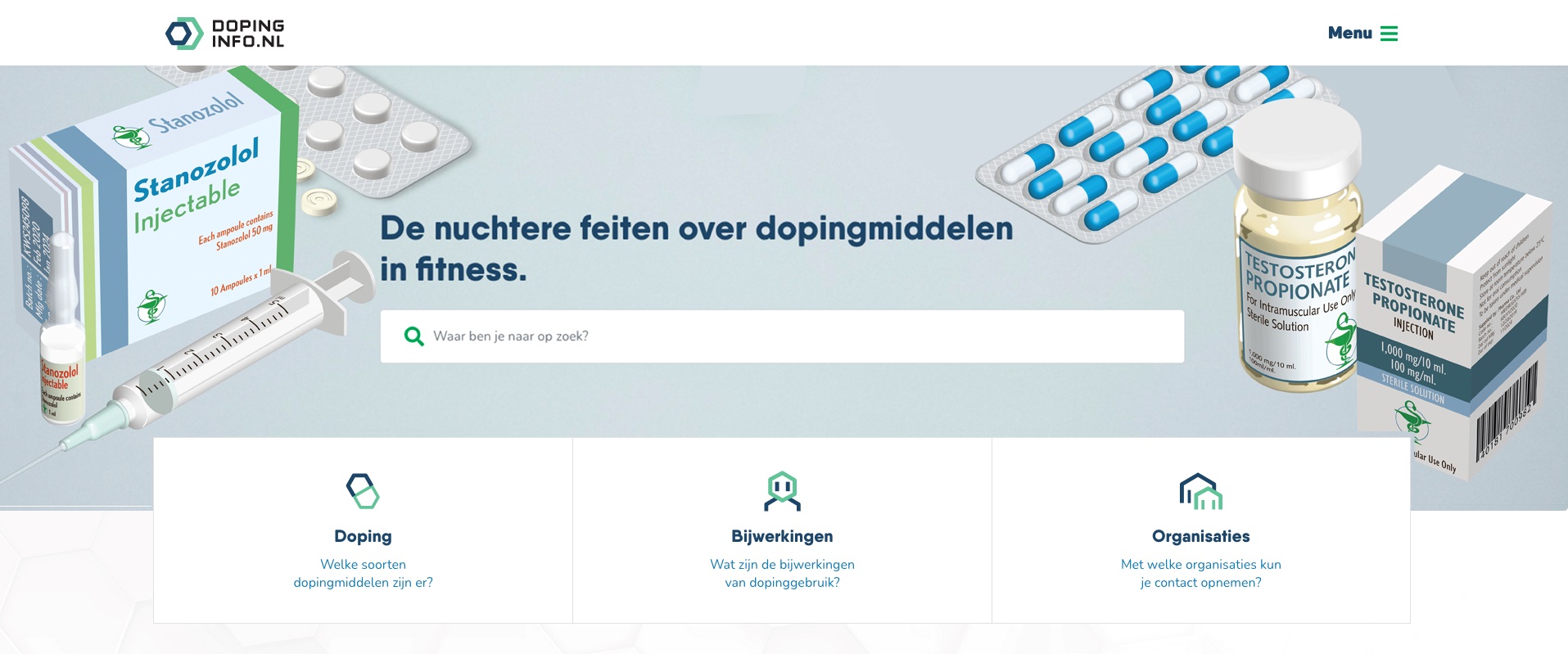
GENERAL PUBLIC
Corporate website
The corporate website of Doping Authority Netherlands is www.dopingautoriteit.nl. We contributed 26 press releases of our own to the site in 2020 (2019: 21). ANP news reports are also an important component of the information we supply. Approximately 201 ANP news reports were published (automatically) on the site in 2020. That is less than in 2019 (229).
Doping Information Line
The Doping Information Line is the front office for all questions (by email/WhatsApp) relating to doping. It is staffed by teams of four working in turn. All questions are processed within one working day and recorded anonymously in a database. The email address is dopingvragen@dopingautoriteit.nl. The mobile number, 06-11226200, is reserved exclusively for WhatsApp. Calls are not answered.
A total of 442 questions were received in 2020. That is 33% less than in 2019, when there were 661 registered questions.
In addition, the numbers of questions per subject were monitored. Individual questions could be allocated to several subjects. The percentages for each subject can be found in the table below. As in previous years, two subjects stand out: checking whether a medicine is on the prohibited list (15.8%) and questions about dietary supplements (35.7%).
Doping Informatielijn 2020
| Subject | Percentage (%) |
|---|---|
| Check on medicines | 15.8% |
| TUE - Exemption procedure | 6.1% |
| NZVT - Dietary supplements | 35.7% |
| Recreational Drugs | 2.7% |
| Dopingsubstances in food | 0.9% |
| Doping control procedure | 4.3% |
| Whereabouts | 3.4% |
| Doping regulations, miscellaneous | 4.1% |
| Doping: effects and side-effects | 8.4% |
| Diet, not dietary supplements | 1.4% |
| Substance analysis | 2.7% |
| Request for educationsessions / materials | 0.7% |
| Request for doping controls | 2.9% |
| Students | 8.8% |
| Miscellaneous | 6.8% |
Club sports and elite sports accounted for 75% of the e-questions, fitness for 9%, and other sectors for 16%. There was one report of a possible doping violation, someone from the press sent a question to the Doping Information Line on three occasions, and one question concerned a positive athlete. Questions received through WhatsApp (169) accounted for 38% of the total.
Presentations
In 2020, the Education Department gave six presentations that did not exactly match the target groups of elite sport or fitness described above (see also Annex 4).
Social Media
Doping Authority Netherlands is active on YouTube, Facebook, Twitter and Instagram. The aim is to reach the target groups better and therefore raise their awareness of the rules, rights and risks. We post, among other things, news items from the corporate website, educational videos and photos of education sessions.
Dutch Caribbean
The development of educational materials specifically for the Dutch Caribbean began in 2020. There will be an information brochure and an e-learning module in Papiamento, English and Dutch. A number of videos will also be translated/subtitled. The educational materials will be available in the course of 2021.
Press contacts
Once again in 2020, Doping Authority Netherlands was approached hundreds of times by journalists with questions about the anti-doping policy, background matters and all kinds of concrete doping cases and problems. However, there were substantially fewer contacts than in previous years. This was undoubtedly attributable to the corona pandemic (which resulted in a substantial scaling down of worldwide anti-doping activities and therefore of the number of detected doping violations). Particularly in the second half of the year, some of the questions related to the impact the pandemic has had or is having on our work. The CEO of Doping Authority Netherlands acted as the spokesperson, with the COO of Doping Authority Netherlands standing in for him when he was absent.